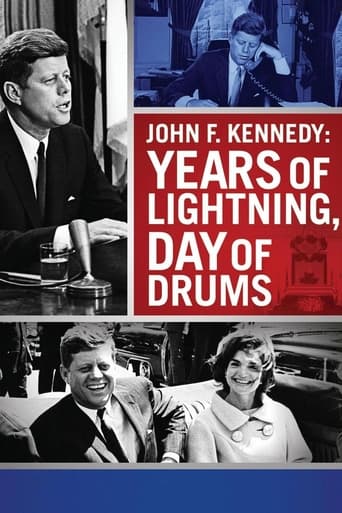MisterChandu
This is a good documentary and I now own a copy. This was a time when being President was like being King! As to the Camelot legend, it has gone south with the times.*This is a documentary that catches a moment but that moment is mostly gloss meant for overseas consumption. Because of the Peace Corp. and other American aid, JFK's photo was found in hamlets in Africa back then. You certainly do not see it now.What did we get from his administration: An arms race, a bigger arms race, and a still bigger arms race. Missiles of October? We came to the brink? Some say his death led us into Vietnam. Would there have been a "Great Society" UNLESS he was killed? History will decide who gets the credit.The sad truth is this man lived, gave us hope, was stupidly killed, turned out to be no saint, and whose death was the opening act on a decade of American style misery.At least we landed on the moon. We could have done so much more.
jmtalk
When I saw this film, I was sitting on the lawn at the Ambassador's Residence, in the Dominican Republic in early 1965. As such, Embassies were given a pre-screening, if you will. Diplomatic families, US citizens & other invitees were privy to this presentation. As a teenager, I missed JFK and was swept up in the production. I do remember thinking it was lovingly offered...and wondered how others might react that were not citizens. I had lived in Santo Domingo for some months at that time, only to be evacuated in late Spring of 1965 due to the revolution. As an adult now, I look forward to viewing this government film again...from hindsight:)
edallan
Obviously, coming from Boston and being a Democrat, I'm biased. But despite the passage of four decades, this film holds up very well in content and presentation. Though fully descriptive, Gregory Peck's narrative is not over-blown, and the narration as a whole allows President Kennedy's own words and actions to speak for themselves. Further, the cuts are long enough to provide more than simple "soundbites" or snippets.This is a film that still has the power to move people, even those who were not yet born and even people who are not American. I have vivid memories of an audience in Ghana in tears in 1971, and even now watching the faces of visitors to the Kennedy Library shows its continuing effectiveness (albeit presumably visitors to the Kennedy Library have a predisposition to view JFK's life and deeds favorably). If you have the chance to see it, you should.
eamonnfitz
Bruce Herschensohn's documentary covers the remarkable 1,000 days of the JFK Administration and the day of the young president's burial. Along with domestic highlights such as Kennedy's White House speech to the first Peace Corps volunteers, the Civil Rights crisis and the space race, there are the dramatic international moments: the Cuban crisis, Berlin crisis — "if war begins, it begins in Moscow, not Berlin" — his journey to Costa Rica, his speech at the Berlin Wall and his visit to the Kennedy ancestral home in Ireland. Interspersed between these segments are poignant scenes from the 1963 funeral. The sense of grief and hope lost is palpable.
Gregory Peck's narration is at times stern, at times wistful: "History will pick up its cold pen and book, and write in chronological order the events of the day with the date and time and the city. But history will be wrong, for there wasn't one date, or time, or city." Produced by the United States Information Agency, Herschensohn's film is historically important as one can witness the process by which JFK the man becomes JFK the myth.

